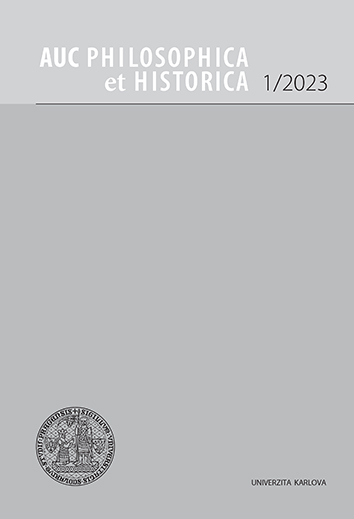AUC Philosophica et Historica je víceoborový akademický časopis zaměřený na humanitní a společenskovědné obory (filozofie, psychologie, pedagogika, sociologie, obecné, české a hospodářské dějiny, pomocné vědy historické a archivnictví, etnologie).
Časopis je indexován v databázích CEEOL, DOAJ a EBSCO.
AUC PHILOSOPHICA ET HISTORICA, Vol 2017 No 1 (2017), 23–40
Problémy s interpretáciou umeleckého diela
[Problems in Interpreting a Work of Art]
Peter Michalovič
DOI: https://doi.org/10.14712/24647055.2017.2
zveřejněno: 23. 03. 2017
Abstract
The article is concerned with problems of interpreting a work of art. As a serious matter in aesthetics, philosophy, and art theory, interpretation was born with the emergence of works of art that required interpretation, for without it they would make no sense and could scarcely become part of the art world. These art works, however, have been interpreted in various ways, and two fundamental lines of understanding the nature of these interpretations have crystallized in the history of aesthetics, the philosophy of art, and art theory. The first line corresponds to the various kinds of exegesis. It gives preference to content over form and is concerned with what a work of art represents and what it refers to. The meaning of the art work then appears as something extra-artistic; if we are to understand the true sense of the art work, we must find the key to it either in social relations or in the depths of the unconscious. The second line corresponds to analysis. It gives preference to form over content and is concerned with how an art work is created, the elements it is composed of, and the kind of function which these elements perform in the complex structure of the work, and how they participate in its construction. The competing relationship between these two lines is extremely important for the life of art works, for those works have a life thanks either to exegeses that add to their meaning or to analyses or descriptions of artistic forms which draw attention to their aesthetically effective component.
klíčová slova: intepretation; exegesis; analysis, art; aesthetics
reference (17)
1. Barthes, R., Lekce, in: Merleau-Ponty, M.; Levi-Strauss, C.; Barthes, R., Chvála moudrosti, Archa, Bratislava 1994, s. 81–99.
2. Barthes, R., Co to je kritika?, Kritický sborník, roč. 14, 1994, č. 1.
3. Bourdieu, P., Pravidla umění. Vznik a struktura literárního pole, Host, Brno 2010.
4. Canaday, J., Mainstreams of Modern Art, Holt, Rinehart & Winston, New York 1959.
5. Danto, A., Hloubková interpretace, Aluze, 2007, č. 2, s. 28–37.
6. Danto, A., Svět umění. Institucionální analýza, in: T. Kulka; D. Ciporanov (eds.), Co je umění?, Pavel Mervart, Červený Kostelec 2010, s. 113–132.
7. Eagleton, T., Úvod do literární teorie, Triáda, Praha 2005.
8. Foster, H.; Kraussova, R.; Bois, Y.; Buchloh, P. H. D., Umění po roce 1900. Modernismus – antimodernismus – postmodernismus, Slovart, Praha 2007.
9. Foucault, M., Rád diskurzu, Agora, Bratislava 2006.
10. Freud, S., O člověku a kultuře, Odeon, Praha 1989.
11. Goldman, L., Humanitní vědy a filozofie, Nakladatelství Svoboda, Praha 1967.
12. Harries, K., Smysl moderního umění. Filozofická interpretace, Host, Brno 2010.
13. Hauser, A., Filosofie dějin umění, Odeon, Praha 1975.
14. Levi-Strauss, C., Mythologica*. Syrové a vařené, Argo, Praha 2006.
15. Padrta, J., Manet, Slovenske vydavateľstvo krasnej literatury, Bratislava 1961.
16. Šklovskij, V., Teória prózy, Tatran, Bratislava 1971.
17. Veyne, P., Jak se píšou dějiny, Pavel Mervart, Červený Kostelec 2010.
